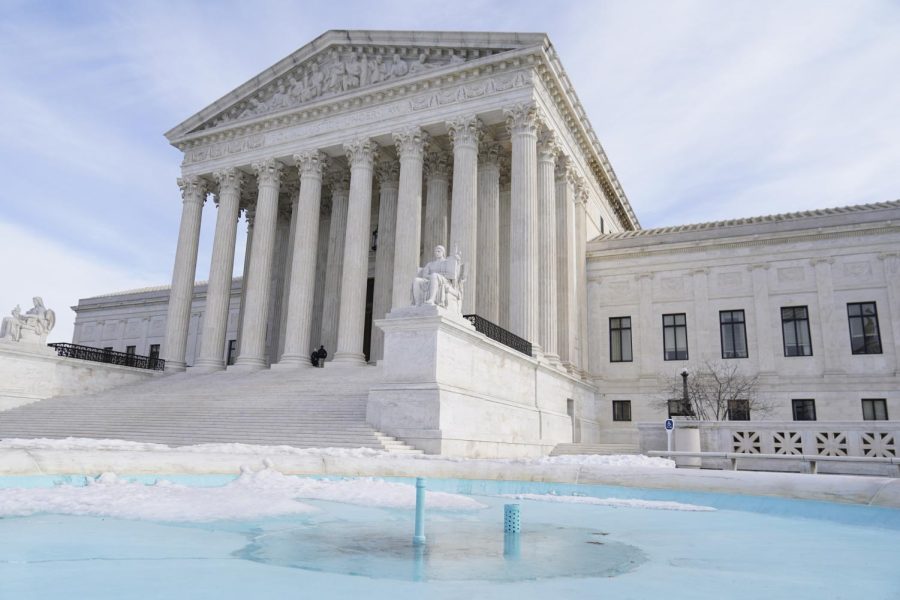Executive privilege, explained
The U.S. Supreme Court on Wednesday, Jan.19, 2022, in Washington.
Jan 26, 2022
Former President Donald Trump’s attempt to invoke executive privilege to maintain the secrecy surrounding his communications during the Jan. 6 insurrection at the Capitol has failed at the Supreme Court.
The Court allowed the ruling from the United States Court of Appeals for the District of Columbia to stand in its decision on Jan. 20. This four-page, unsigned ruling has already led to the flow of documents from the National Archives to the Select Committee to Investigate the January 6th Attack on the United States Capitol.
The ruling essentially ignored Trump’s status as a former president in his appeal, reading, “Because the Court of Appeals concluded that President Trump’s claims would have failed even if he were the incumbent, his status as a former President necessarily made no difference to the court’s decision.” In doing so, the Supreme Court neglected to involve themselves in questions of Constitutionality and precedent regarding presidents invoking this privilege after their term concluded.
Reps. Bennie Thompson, Democrat of Mississippi and chair of the committee, and Liz Cheney, Republican from Wyoming and vice-chair, called the decision “a victory for the rule of law and American democracy.”
Meg Frankenberger ‘20, a graduate student at The Fletcher School at Tufts University, recognizes the weight of this ruling. She argues, “The Supreme Court’s decision to deny President Trump’s claim to executive privilege, while leaving out constitutionality, certainly signals the severity and importance of this case.”
President Trump had attempted to bar the release of communications during a several-hour period on Jan. 6 to the Select Committee. Though some argue that President Biden could utilize his executive authority to protect the secrecy of the documents, he has refused to do so. In Oct. 2021, the White House issued a letter to the National Archivist arguing for the importance of access to communications.
Dana Remus, Counsel to the President, wrote, “President Biden has determined that an assertion of executive privilege is not in the best interests of the United States, and therefore is not justified as to any of the Documents.”
The letter further suggests that President Biden and his administration seem to believe that former President Trump bears at least some responsibility for the insurrection. The letter continues, “The available evidence to date establishes a sufficient factual predicate for the Select Committee’s investigation: an unprecedented effort to obstruct the peaceful transfer of power, threatening not only the safety of Congress and others present at the Capitol, but also the principles of democracy enshrined in our history and our Constitution.”
In Dec. 2021, the D.C. Circuit Court ruled that former President Trump failed to provide substantial justification to maintain the secrecy of his communications.
Beyond this legal battle, former President Trump has been slow to supply documents after subpoena. These actions may be dillitory, attempting to slow the progress of the Select Committee. Rep. Thompson and Rep. Cheney initially planned to conclude committee proceedings by Spring 2022, which gives former President Trump reason to wait until the last second to submit documents as required; after all, if the proceedings are concluded, he just may be able to wait the committee out.
Beyond the former President, the Select Committee has also sought out records from Eric Trump, Ivanka Trump, Mark Meadows, Kayleigh McEnany and other individuals who worked closely with the administration during Trump’s term.
The Committee already has obtained information of the former president’s actions during the events. In Jan. 2022, Rep. Thompson explained, “We have significant testimony that leads us to believe that the White House had been told to do something… We want to verify all of it so that when we produce our report and when we have the hearings, the public will have an opportunity to see for themselves… The only thing I can say, it’s highly unusual for anyone in charge of anything to watch what’s going on and do nothing.”
Frankenberger agrees, writing, “…it shows the Court’s agreement with Congress that what happened on January 6 is not okay, and that it’s essential to our democracy and security for the people responsible to be held accountable.”
The Supreme Court’s refusal to overturn the Appeal Court’s ruling on former President Trump’s attempt at executive privilege represents a large step forward for the Select Committee, especially as it seeks to release its report sometime early this year. Among subpoenas of other individuals, this ruling indicates that Trump is not protected by his executive experience to maintain secrecy in an investigation into potential involvement in the insurrection.
Aiden Keenan is a senior at John Carroll University and is the photographer editor for The Carroll News. He can be reached through email at akeenan22@jcu.edu or on Twitter @AidenJKeenan.













